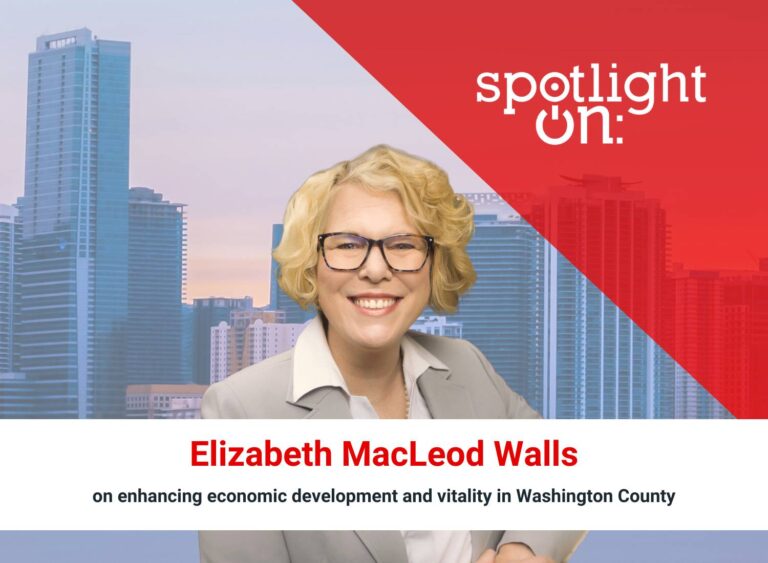Spotlight On: Karen Hatcher, CEO & Qualifying Broker/2022 President, Sovereign Realty & Management/Atlanta Realtors Association
 February 2023 — Karen Hatcher, 2022 president of the Atlanta Realtors Association, and the CEO and head broker of Sovereign Realty & Management, spoke with Invest: about the profound impact the organization is making on providing equity and investment protection around housing in the Atlanta region, for both owners and realtors. “We’re politically active to make sure property rights are protected and housing opportunities are shared for all,” she said.
February 2023 — Karen Hatcher, 2022 president of the Atlanta Realtors Association, and the CEO and head broker of Sovereign Realty & Management, spoke with Invest: about the profound impact the organization is making on providing equity and investment protection around housing in the Atlanta region, for both owners and realtors. “We’re politically active to make sure property rights are protected and housing opportunities are shared for all,” she said.
What have been the major highlights for the Atlanta Realtors Association (ARA) over the past year?
Our association has been on a three-year path of righting the wrongs of the past and making sure we represent all members and consumers across the board. In a city that’s ~50% African American, less than 30% of our membership was African American, and even less than that for Hispanic and Asian members. We want to be more inclusive to represent all our members, whether it’s geographic, age brackets, the type of real estate sold, or size of brokerages, to name a few. For me personally, it was also a huge honor being selected as the first Black/African American woman president of the ARA in 2022, 112 years since its inception. In the past year, we also had our most diverse board ever elected, including the first Hispanic board member. We created a memorandum of understanding with all multicultural groups in the city, so their appointed representatives now have a voting seat on our board. It gives our advocacy far more equity in all real estate initiatives. We also made investments, including $20,000 allocated to those affiliated associations with sponsorships and memberships. We reached record membership in 2022, ending with 14,193 members, a 10% increase over 2021.
How is affordable housing influencing the ARA’s work?
This has been a huge and still growing conversation in Atlanta. For ARA’s part, our affordable housing committee had its full first year in 2022 and it turned into our largest committee, with over 160 members. On top of that, our DEI Council has brought another 110 members to serve. While we love the growth metro Atlanta is experiencing, with a 16.9% increase over the last year, it’s also caused housing appreciation to grow by 1 to 2% a month during the first half of 2022. Not to mention that we only had about a month of inventory to work with at the start of 2022. The committee has been critical in advocating for legislation and collaboration that can mitigate these rising costs with workable solutions for residents and communities. We’re politically active to make sure property rights are protected and housing opportunities are shared for all. To that end, our PAC fundraising is up 22% and that will go a long way to working with the city on the challenges facing real estate, from land scarcity to zoning and ordinances.
In what ways does the ARA support the Atlanta community?
We’ve made strategic alliances with multicultural and affiliate groups across the city, we are active and have asked our members to be active in our NPU’s and HOA’s. Whatever the political belief, we’re educating our members, upholding fair housing laws, and Realtors should be represented on every real estate committee in every municipality. Last year, we launched the Atlanta Realtors Community Impact Foundation. ARA donated $135,000 to our foundation and the foundation gave out 10 $1,000 scholarships to students whose parents or grandparents are Atlanta Realtor members. It’s a means to promote education and give back to our communities. The scholarship also applies to students attending trade school, allowing us to support the construction industry and our future building talent. Construction has seen a steep decline in workforce, so tying that in with real estate can really open these students’ eyes to the opportunities in the industry. We have also launched the ARA Cares Fund and donated $7,500 in care benefits for Realtors experiencing medical hardships they can’t afford. Realtors are the voice of real estate and closest to the community. We build communities, putting people in homes every day.
How is Atlanta managing its economic growth?
We must balance social needs with corporate needs if we are to have smart growth. And that’s precisely what is so attractive about Georgia. We have a diverse population which attracts businesses, but we also need adequate housing to accommodate their workforce. That takes a mix of having the right housing stock and creating the right zoning, while keeping things like competitive wages in mind and maintaining our Atlanta culture that we know and love. We need a solid tax base, but we want to make sure that taxes stay low to attract those companies. There’s a lot to consider but the state is in a great place geographically and economically to be a place of growth and success for everyone here. We’re on a critical path, collaboration is key and we have the right parties at the table. I feel confident we will get this right.
What is your assessment of the trends in Atlanta real estate right now?
Atlanta literally doesn’t have anything physical to stop our real estate growth, whether it’s a mountain or an ocean. We have development happening all over the metro. The farther out people drive, they can find a spot they can afford that works for them, but it’s just further and further out, which might shift the burden on transportation. The issue is, we don’t have the inventory. We are still hovering around two months of supply. Therefore, prices have risen, pricing those with lower income out of participating in the market, and those that want to move, don’t have anywhere to go. But the most activity is in Midtown with the residential, tech firms and offices going on there. The greatest opportunity is in the undervalued communities and areas right outside the urban core. The urban core is where medium density multifamily will be most essential, near transit and commercial corridors and where zoning is key. Exclusionary zoning in the suburban areas will also need to be addressed so developers can build at lower costs which would result in a lower price for the end user, the buyer.
For more information, visit:













